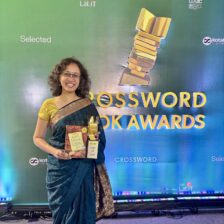So many TED talks make me chuckle and nod in agreement that I wish to express so strongly!
“I agree!” I want to say. “Oh, I agree, I agree, I agree a thousand times over!”
Sometimes, I think, “And I have more to add to that. Think about this, in the same context. I’ve felt and thought this, and this, and this!”
And then I realise, sitting alone with my laptop, I’m agreeing with a screen and myself.
I just listened to a TED talk by Chimamanda Ngozi Adichie. I had never heard of her, but now, she fills me with all the joy and empathy of a kindred spirit, with respect to so much of what she says.
At about the age of seven … I wrote exactly the kinds of stories I was reading: All my characters were white and blue-eyed, they played in the snow, they ate apples, and they talked a lot about the weather: how lovely it was that the sun had come out. This despite the fact that I lived in Nigeria; we didn’t have snow, we ate mangoes, and we never talked about the weather, because there was no need to.
How much I identify with this! How my characters (aged seven and a half) loved the sun! And of course, I had stories about characters called Jack and Amelia (and titles like ‘Dame’ that I did not understand), despite the fact that we had such beautifully earthy names like Varsha and Nisha.
The single story creates stereotypes, and the problem with stereotypes is not that they are untrue, but that they are incomplete. They make one story become the only story.
I feel the truth of this so often when asked questions about India – especially ‘yes/no’ questions! Is India a poor country? Are there illiterate people in India? Do people in India wear saris?
I’m filled with agreement.
The ‘authenticity of the [Indian] voice’.
The danger of the single story.
Now I want to read her books.

Leave a Reply